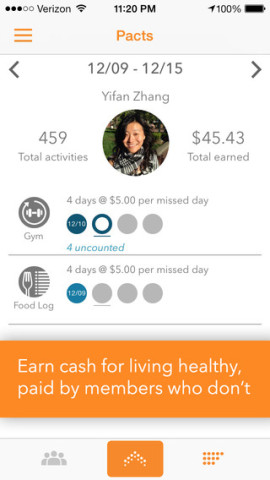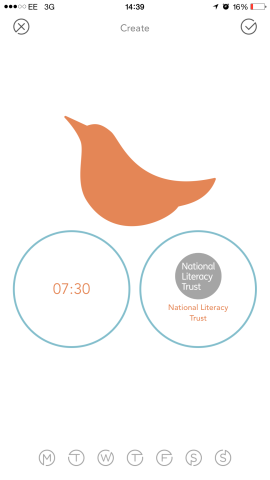There is a growing number of apps that are taking a different approach to motivating users
Thanks to the arrival of the Health app and the iPhone 6 and 6 Plus the focus in 2014 was on Apple’s fitness and tracking capabilities. However, this focus on more passive monitoring allowed another thread – a more active approach to wellbeing slip by unnoticed. It was a school of thought that noticed that simply tracking health information wasn’t going to drastically change a lifestyle – after all, if users don’t like the direction in which their weight is going, it’s very easy to simple ignore it. What they need is a little more active motivation.
Certain app developers have noticed that a vast range of users need a little more than just alerts when it comes to encouragement when they try to reach goals – fitness or otherwise, and as a result a whole host of motivation apps are revolutionizing iPhone owners’ lives. These apps are going beyond regular app incentives. Rather than unlocking features by completing tasks, or gaining levels – or simple alerts, there are a growing number using real financial incentives to help users reach goals, putting more emphasis on user responsibility.
Financial rewards
One area where this still slots in perfectly is, of course – fitness. In 2015, you may be thinking about either signing up to a gym, or you may just have noticed others talking about getting in shape. Or you may simply be frustrated by an inevitable influx of guilt-trippers trying to work off the holiday ham before February arrives. It’s this type of approach to health that has birthed apps like Pact, by GymPact, which recognizes that people need a little extra encouragement. Even better, they have provided it in the form of financial rewards. Or punishments.
So how does it work? First, users need to download the Pact app, and then – they need to think of some goals. Pact covers a whole range of health and fitness goals, including simple exercises, where it uses the phones GPS to track your activity, to food goals, such as eating more veggies. Users can set up an amount they want to eat – say three servings a day. Then they need to place an amount on that goal, say $10. Evidence needs to be provided in the form of photos for goals like this. And if that user fails, that $10 is taken from their account and put towards the community. For users that reach their goal, they receive a windfall paid for by other members of the community that didn’t reach their goals. It’s not going to be much, but the idea is to complete the goal, not make money.
Other apps exist that try and do the same thing, but Pact’s community and real-world money drive makes it a leading force.
Sleepy head
Of course, a new year leads plenty to reflect on their lives. Not only do people look at whether they’re looking after themselves, they may also ask if they’re doing enough for others. iCukoo is another app that slots into this genre. Based out of, and currently focusing on the UK – the app uses punishment to benefit others. Of course, this requires you to wrestle with the idea of whether a charitable punishment for being lazy really is a valid form of self-improvement. But you could just use these kinds of apps as being the catalyst to your new life as a charitable hero.
So how does this app work? Well, it taps into the everyday person’s daily battle with the snooze button. That’s right, with each failed attempt to get up – the app donates to a charity. Set the alarm, select a charity (the app currently has a selection of five UK-based charities), and then decide how much your snooze is worth.
Snooze you lose
Then, every morning, if you hit the snooze button on the alarm the app will recognize it. If you’re worried that you’ll forget it’s turned on, and you’ll end up accidentally giving $1,000 to the local dogs home, don’t worry – the app is far more friendly than something like GymPact. When the snoozes add up to £1 the app texts the user to confirm sending the amount to a charity, which will be added the phone bill, rather than needing to use any kind of credit card. Of course, they don’t have to say yes, but that’s kind of missing the point, right?
iCukoo was created by the Chelsea Apps Factory in London. Josh Hart, one of the developers of the project sees it as a great way to make people feel less guilty about certain decisions they make. “I’m the kind of person who doesn’t wake up easily,” Hart has said. “I feel so guilty, because I’m so hungry as a human being—we all are—to do something with our time, and there’s only so much of it. I don’t know any snoozer who feels totally guilt-free for snoozing on a weekday.”
Download iCukoo (UK-only)
Equivalent apps that operate in the US have existed, such as Snooze – but it’s no longer available. However, iCukoo has been a huge success and a US-based charity snooze app won’t be far behind.
Of course, all these apps go hand in hand with Apple’s renewed focus on fitness and health. With the Apple watch also coming sometime in the next few months, relying on our iPhones to help us reach our goals is going to become even more prevalent. The possibilities are wide and varied as the globe continues to turn towards technology to help achieve goals. So what’s next? An app that shouts “don’t let this person eat cake” everytime they walk into a cake shop? Okay – how about this. Would you use an anti-procrastination app that disables Facebook every time you miss a pre-entered deadline to take out the trash? If the answer’s yes, then there may well be a developer out there working on it right now.



